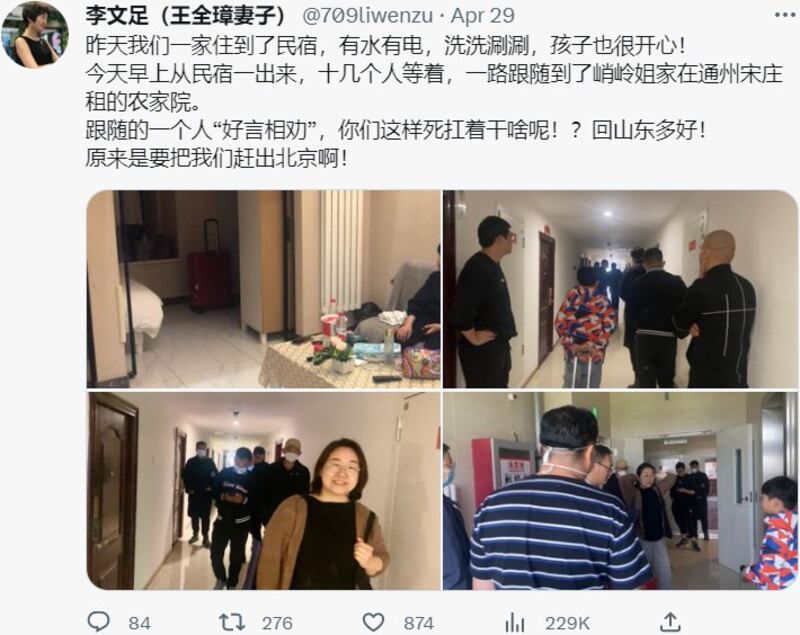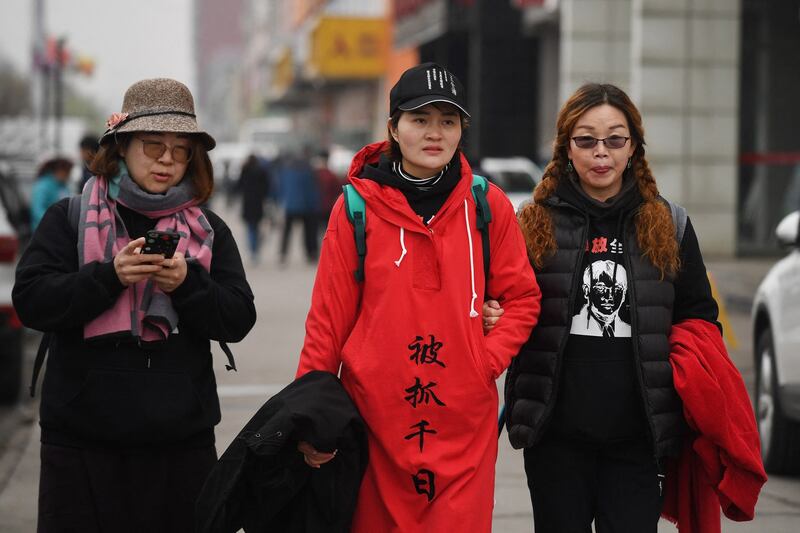Beijing authorities have refused to accept Wuhan-based citizen journalist Fang Bin for relocation after he was bundled onto a high-speed train for the capital shortly after his release from a three-year jail term on Sunday.
Fang was sentenced to three years' imprisonment at a secret trial on orders from Beijing after filming from hospitals and funeral homes early in the COVID-19 pandemic, Radio Free Asia reported last week.
After his release, he was turned around and sent right back again by Beijing police as the authorities stepped up "stability maintenance" measures aimed at getting rid of other politically sensitive figures who have made their homes in the capital.
The Wuhan authorities had believed they were relocating Fang to live with his son, but his son was himself under huge political pressure from the authorities not to have Fang Bin live with him, according to a person familiar with the matter.
"His son was apparently under pressure, and that made his father unwilling to stay in Beijing, so the son took Fang Bin out to eat, bought him some clothes, then Beijing police bought Fang Bin a high-speed train ticket and sent him back to Wuhan on the train that same evening," said the person, who asked to remain anonymous.
Fang was scheduled to arrive in Wuchang, one of the cities in the Wuhan conurbation, at around 9.00 a.m. on Monday, where he was reportedly met by relatives, according to another person who asked not to be named for fear of reprisals.
However, repeated attempts to contact him were unsuccessful on Monday.
"The police told Fang Bin that he's not allowed to give any interviews or post videos online," the person said.
"He went to the traditional Chinese clothing store that he used to run in Hankou North this afternoon, but found that everything in it had been taken away," the person said. "I heard that Fang Bin lost a tooth in prison, but I don't know exactly how."
His release comes amid reports that Fang's sister is unwilling to have him living with her, according to someone familiar with the matter who gave only the surname Liu.
"Fang Bin's sister is likely under pressure [from the authorities], and doesn't want Fang Bin living with her," Liu said. "He will stay with his sister [Monday] night, then will find somewhere else to live in Wuhan later."
"But the Wuhan police don't want Fang Bin to stay in Wuhan either," Liu added.
Cut off water, power and gas
Meanwhile, Beijing police are putting further pressure on a prominent human rights lawyer and his family to leave the city where they have made their home, and where their son attends school.
Li Wenzu, wife of Beijing-based rights attorney Wang Quanzhang, has moved out of the family home with the couple's son after the authorities cut off water, gas and electricity supplies to their apartment, they said.

"There was no water, electricity or gas in the place we used to live," Wang said in an interview on Monday. "It was impossible to carry on living there."
"Now it's surrounded by people [police and officials] who follow us everywhere, and stop us from finding a new place," he said.
A nationwide police operation under the administration of President Xi Jinping has targeted more than 300 lawyers, law firms, and related activists for questioning, detention, imprisonment, debarring, and travel bans since it launched in July 2015.
Li, who has been staying at a bed-and-breakfast with the couple's son since Saturday, said state security police are now putting huge pressure on the family to go and live in the eastern province of Shandong, effectively kicking them out of the capital.
"Whenever we go anywhere, we are followed by a lot of people, who ask us what we're doing, and talk about how great Shandong is," Li said. "I think their intention this time is to drive us out of Beijing."
"This is how they treat people they don't like."
Li said the family are unlikely to be allowed to leave the country, however.
"They won't let me and Quanzhang apply for passports," she said, adding that she fears for the impact of the eviction on her son Quanquan.
"He is a little irritable and emotional but ... suppresses it when talking to me, because he says his parents have to deal with so many people," she said. "He feels like he has to be good because it's not easy for us."
"We sent him to a friend's house ... but they live far away, and his journey to school would take several hours from there, so this is a temporary arrangement," she said.
Break up and isolate
Wang Qiaoling, wife of fellow rights attorney Li Heping, said she was also followed when she visited Li Wenzu at the B&B, by people implementing China's " stability maintenance" system targeting dissidents and others deemed potential troublemakers by the ruling Chinese Communist Party.
"Stability maintenance has been upgraded, and the use of forced eviction is now more common than before," Wang told Radio Free Asia. "The means they use to relocate people are also worse than they used to be."

She said Li Wenzu and Qianqian had gone to stay with her, but then the landlord of the apartment she and Li Heping rented had said they would evict them in two weeks' time.
Li Wenzu and Wang Qiaoling were also targeted for eviction in 2021 after they declared they would stand as candidates in local elections in a public challenge to the ruling party while their husbands were still in prison.
Current affairs commentator Li Fatian said the authorities in Beijing are looking to disperse "politically sensitive" activists and dissidents from the city.
"They want to break up these people ... and isolate them," Li said. "The authorities feel they are being successful if they can maintain stability."
He said similar moves have been afoot in other major cities in recent weeks, including the southern city of Guangzhou and the eastern city of Hangzhou.
Wang Quanzhang was released from Shandong's Linyi Prison at the end of a four-and-a-half year jail term handed down on Jan. 28, 2019, by the Tianjin No. 2 Intermediate People's Court, after being held in pretrial detention for more than three years with no access to a lawyer or family visits.
He was initially held in his hometown in Shandong before traveling to Beijing to be reunited with his family.
Translated by Luisetta Mudie. Edited by Malcolm Foster.

